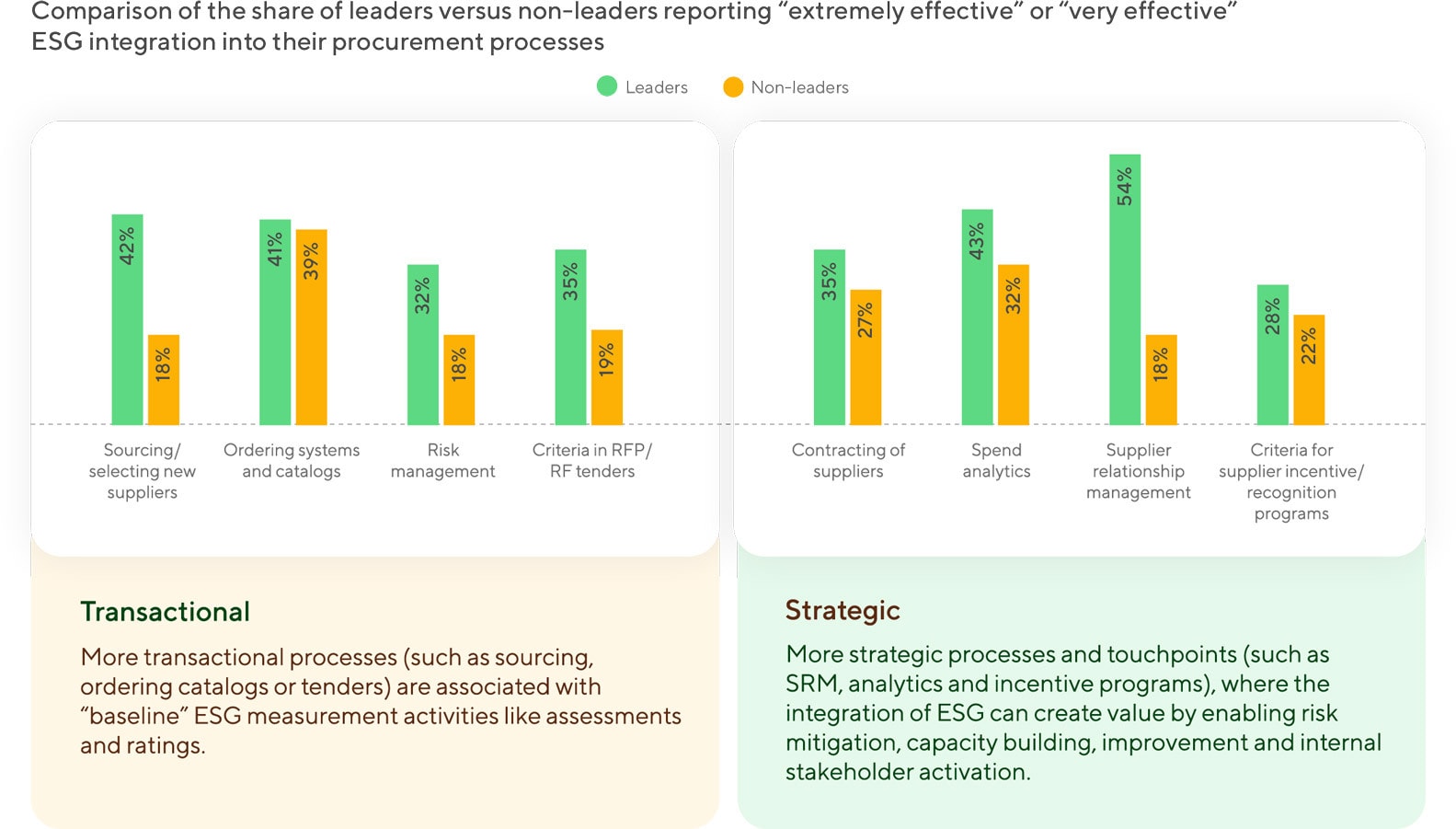Taking an iterative approach to sustainable procurement can set up a virtuous cycle that
drives value creation. That’s one of the key lessons from our most recent Sustainable
Procurement Barometer, which seeks to identify leaders in the field and gain insights into
what they’re doing right.
We’ve been publishing the Barometer every two years since 2007. To develop the latest
edition we worked with Accenture, surveying almost 600 buyers and more than 1,000
suppliers around the globe.
The results of this year’s Barometer indicate that there are four key elements of a sustainable
procurement strategy: a holistic approach; data integration; “paying it forward” by investing
to benefit suppliers; and stakeholder engagement. This iterative cycle revolves around several
key steps: investing in sustainable procurement initiatives, generating data to convey the
story to stakeholders, realizing and communicating sustainable procurement benefits, and
then reinvesting to repeat the process.
We have witnessed a transformative shift in sustainable procurement in recent years: it is no
longer seen primarily as a way to mitigate risk or meet regulatory demands, and is coming to
be recognized as a central element of driving innovation, efficiency and ultimately,
profitability. By using sustainability as a catalyst, forward-looking companies can transform
the procurement function into a strategic partner that drives value creation. How do they do
it?
● The first of the four principles we identified is to take a holistic approach. Leaders in
sustainable procurement – about 10% of the companies we surveyed – have
incorporated sustainability into at least four of eight procurement processes, with a
minimum of one process being digitally integrated. They’re broadening their focus
away from the central concern of decarbonization, which is where many
organizations begin their sustainability journey. For leading companies, sustainability
isn’t an afterthought; it’s increasingly at the heart of procurement.
● Next, companies with the most mature sustainable procurement practices have a
focus on data integration. They build robust procure-tech foundations that allow
them to integrate a variety of datasets, gaining a contextual understanding of ESG
impacts across their organization. Leading companies don’t rank data accuracy as
one of their top-three organizational challenges, indicating relatively high confidence
in their figures. The most successful procurement teams invest in advanced tools to
gain visibility and deepen ESG engagement, integrate the resulting KPIs broadly
across P2P processes, align team skills and incentives to outputs and leverage
technology and data analytics to showcase their success within the company. This
visibility facilitates storytelling and enhances the case for further investment, helping
them secure support from stakeholders, which keeps the virtuous circle in motion.

● And the leaders aren’t just investing internally. Paying it forward is a philosophy of
investing in sustainability programs that benefit suppliers, with the realization that
this commitment will improve both performance and data quality. By demonstrating
a commitment to suppliers and their needs, sustainability leaders gain a credit of trust
and open up new opportunities to expand their programs. Across all the companies
we surveyed – not just leaders – the focus on cost reduction in supply-chain
sustainability has dropped from 36% of companies as recently as 2021, when we
published the previous Barometer, to 25% today. When companies realize that the
point of sustainability is value creation, not cheaper inputs, they are more willing to
help meet suppliers’ needs. Leaders say that just 9% of their sustainable procurement
programs are driven by cost reduction.
● The final element of a successful sustainable procurement model is stakeholder
engagement, particularly among an organization’s leaders. To succeed in driving
change across the organization, Chief Procurement Officers need to cultivate
alliances among other C-suite executives. Data integration, analytics, and the use of a
robust digital platform are key here. Combining ESG performance data with spend
analytics provides insights that procurement that leading CPOs use to communicate
the impact of their program to C-suite peers. Sustainability leaders report higher data
availability across all functions in the organization – from finance and investor
relations, through marketing and sales, to HR and talent management. Programs
reporting high integration have best practice adoption rates 1.7 to 2 times higher than
those with lower integration, and are 3 to 4 times more likely to have “strategic-level
engagement” with C-suite stakeholders.


Evidence from sustainability leaders shows that embracing an iterative approach grounded
in these principles is the most reliable pathway to benefitting from sustainable procurement.
Beginning with small steps and continuously building on successes has allowed companies
across all industries to consistently embed sustainability in their procurement practices,
driving value creation and fostering lasting impact across their supply chains and beyond. To
take the next step on your sustainable procurement journey, check out the full Barometer
here.
About the Author
Follow on Twitter Follow on Linkedin Visit Website More Content by EcoVadis EN























